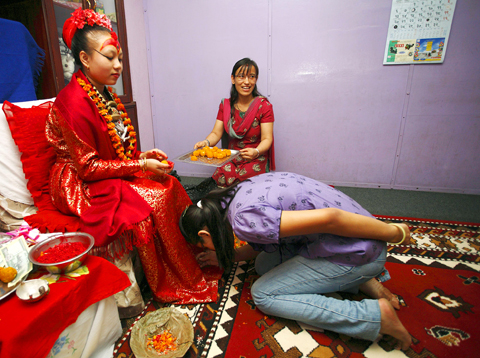Perhaps divine intervention palyed a role.
A Nepali girl revered by many as a “living goddess” has become the first sitting deity to pass the high school leaving certificate exam, setting her on course for a career in banking.
Chanira Bajracharya, 15, called “Kumari,” was among nearly half a million children who took the exams in March. The results were declared late on Friday.

PHOTO: REUTERS
“She scored 80.12 percent marks in the exam,” said Abha Awale, a teacher who gave private tuition to the girl in her temple as she is not allowed to mingle with outsiders.
“This is a distinction [top grade],” she said.
Bajracharya has already scored high marks among devotees in the ancient town of Patan, south of Kathmandu, where she rides in decorated chariots 18 times a year during Hindu and Buddhist festivals.
She has been Kumari of Patan for nine years now.
Relatives and friends gathered outside Bajracharya’s red brick house yesterday to greet the Kumari with folded hands.
Bajracharya, who has a third eye painted on her forehead, said in a rare interview in April she wanted to study commerce or accounting and work in banking.
Former Kumaris, considered incarnations of the Hindu goddess Kali, have gone on to work or got married after they retired, which is usually at the onset of puberty.
Girls from Kathmandu’s Newar community are chosen by Buddhist priests to serve as “living goddesses,” and confined to temples in the three ancient cities of the Kathmandu valley.
Critics say the centuries-old tradition denies them a normal life and leaves them unprepared to face real life after retirement.
Two years ago, Nepal’s Supreme Court ordered the government to ensure basic healthcare and education for the Kumaris.
Early this week, the Nepali government raised by a quarter the maintenance allowance provided to the Kumari and said it would bear the expenses for her education.

Seven people sustained mostly minor injuries in an airplane fire in South Korea, authorities said yesterday, with local media suggesting the blaze might have been caused by a portable battery stored in the overhead bin. The Air Busan plane, an Airbus A321, was set to fly to Hong Kong from Gimhae International Airport in southeastern Busan, but caught fire in the rear section on Tuesday night, the South Korean Ministry of Land, Infrastructure and Transport said. A total of 169 passengers and seven flight attendants and staff were evacuated down inflatable slides, it said. Authorities initially reported three injuries, but revised the number

A colossal explosion in the sky, unleashing energy hundreds of times greater than the Hiroshima bomb. A blinding flash nearly as bright as the sun. Shockwaves powerful enough to flatten everything for miles. It might sound apocalyptic, but a newly detected asteroid nearly the size of a football field now has a greater than 1 percent chance of colliding with Earth in about eight years. Such an impact has the potential for city-level devastation, depending on where it strikes. Scientists are not panicking yet, but they are watching closely. “At this point, it’s: ‘Let’s pay a lot of attention, let’s

UNDAUNTED: Panama would not renew an agreement to participate in Beijing’s Belt and Road project, its president said, proposing technical-level talks with the US US Secretary of State Marco Rubio on Sunday threatened action against Panama without immediate changes to reduce Chinese influence on the canal, but the country’s leader insisted he was not afraid of a US invasion and offered talks. On his first trip overseas as the top US diplomat, Rubio took a guided tour of the canal, accompanied by its Panamanian administrator as a South Korean-affiliated oil tanker and Marshall Islands-flagged cargo ship passed through the vital link between the Atlantic and Pacific oceans. However, Rubio was said to have had a firmer message in private, telling Panama that US President Donald Trump

CHEER ON: Students were greeted by citizens who honked their car horns or offered them food and drinks, while taxi drivers said they would give marchers a lift home Hundreds of students protesting graft they blame for 15 deaths in a building collapse on Friday marched through Serbia to the northern city of Novi Sad, where they plan to block three Danube River bridges this weekend. They received a hero’s welcome from fellow students and thousands of local residents in Novi Said after arriving on foot in their two-day, 80km journey from Belgrade. A small red carpet was placed on one of the bridges across the Danube that the students crossed as they entered the city. The bridge blockade planned for yesterday is to mark three months since a huge concrete construction